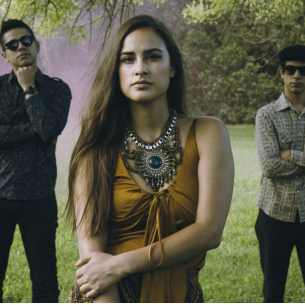“My mom was a piano teacher, my dad a drummer, my grandmother also played the piano, even though she wasn’t a professional musician. Really, I saw it as something completely natural, as a family expression”, says Harold Lopez-Nussa about choosing music as a career.
The highly regarded Cuban-French jazz musician, winner of the famed Parmigiani Montreux Jazz Solo Piano Competition, is also the first Cuba-based musician to sign on to a U.S. label and release an album internationally since the easing of the restrictions associated with the decades-long trade embargo (El Viaje, Mack Avenue Records, 2016).
Speaking from Boston in the midst of a U.S. tour that will bring him to Chicago on October 19, Lopez-Nussa continues to describe a series of musical studies culminating in a degree in classical piano from the Instituto Superior de Artes (ISA). It was a very rigorous environment, he says, “..in Cuba, there’s no way to study music lightly. You’re in it or you’re not”.
He completed the Russian-style classical curriculum and only later, wanting to learn Cuban popular music and jazz (genres for which no academies or schools exist in Cuba) Lopez-Nussa began to learn these rhythms and melodies “in the streets, using your ear, playing with other musicians”.
Additionally, as Lopez-Nussa has dual Cuban-French citizenship (His piano-playing grandmother was French, met and married Lopez-Nussa’s Cuban grandfather in the early stages of the Cuban revolution and chose to stay on the island), he travels to France every 3 years and considers Paris as influential as his homeland in terms of forming his musical vision.
But this Parisian influence is more African than French. In Paris, Lopez-Nussa began to collaborate with Senegalese bassist Alune Wade, and in the process discovered modern African music, noting that even though Afro-Cuban music and African music share a common heritage, the two evolved on markedly different paths.
El Viaje, Lopez-Nussa’s latest album, shares these modern African influences, explaining that the album was a way of musically approaching a continent that marveled him. In El Viaje, Lopez-Nussa extends and deepens the collaboration with Alune Wade (who adds ethereal vocals as well as superb bass-playing) as part of a trio with his brother, drummer Ruy Adrián López-Nussa. The recording also incorporates their father, Ruy Francisco Lopez-Nussa.
The album is a heady musical journey indeed, presenting highly evocative Cuban jazz pieces, delicately nuanced with contemporary Senegalese tinges reminiscent at times of mbalax, a type of Senegalese popular music that in originated in combining traditional Wolof dance and drumming patterns with Cuban popular music. Full musical circle indeed!
Lopez-Nussa speaks of the physical and musical trip that El Viaje also references: “As musicians, we are always traveling and getting to know different cultures, making new friends every place we are, and that’s marvelous, a blessing we have. But at the same time, it’s hard. You’re always traveling and being away from the family. But this nurtures us and makes us grow as artists”.
He also loved the idea of being able to travel through the music: “When I started to study music, my professor always showed images as I was learning doing a classical or baroque piece. Today I still do that. When we play a different song, we always try to travel in the world of that different music. If I play adanzón here in Boston, I’ll be taking you to Matanzas, where the danzón was born.”
Lopez-Nussa is excited about the opportunities for Cuban artists that are beginning to take form in this new era of political aperture, including recording with a North American label, something inconceivable until very recently. And he muses, “The people of Cuba and the people of the United States never deserved that separation. I have lots of hope that it will all be better. I don’t have any certainty as to what will happen, but I do have hope.”
—
Harold Lopez-Nussa will perform in Chicago on October 19 at The Space in Evanston.
—
Check Catalina’s weekly exploration of Latin music on Beat Latino.
